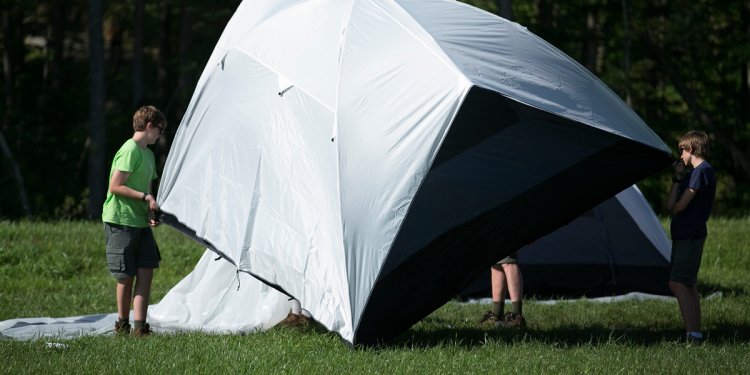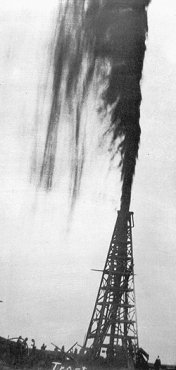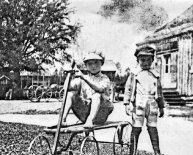
Sid Richardson Boy Scouts California Camp
For Texans, the 20th century did not begin on January 1, 1901, as it did for everyone else. It began nine days later, on Jan. 10, when, spurting drilling pipe, mud, gas and oil, the Lucas No. 1 well blew in at Spindletop near Beaumont.
The gusher spewed oil more than 100 feet into the air until it was capped nine days later. With that dramatic fanfare, Texas' economy was wrenched from its rural, agricultural roots and flung headlong into the petroleum and industrial age.
 |
|
Spindletop blows in. Dallas Morning News file photo.
|
In the last two decades of the 19th century, railroads had made sweeping changes in the lives of many of Texas' mostly rural, mostly agrarian citizens and forever altered the face of the state. Settlements formed around temporary railroad-workers' camps. Speculators created brand-new towns out of virgin prairie beside the gleaming rails. And existing communities that were bypassed by the tracks often curled up their municipal toes and died unless they were willing to pick up businesses, homes and churches and move to the rails.
The arrival of railroad transportation expanded Texas farmers' and ranchers' markets by providing faster and cheaper shipping of products. Cattle raisers were no longer forced to trail their herds long miles to railheads in the Midwest. In their classic Texas history text, Texas, the Lone Star State, Rupert Richardson, Ernest Wallace and Adrian Anderson summarized it this way: " ... railroads were the key to progress and prosperity at the end of the 19th century."
When oil came gushing into Texas early in the 20th century, the changes were even more profound. Petroleum began to displace agriculture as the principal engine driving the economy of the state, and Texans' lives were even more drastically affected than they had been by railroads.
The impact of oil on Texas and Texans is often analyzed in terms of corporate development, personal and corporate wealth, and the overall economy of the state and politics. Oil also dramatically affected the lives of those who owned the land from which oil was produced, or who were directly involved in oil exploration, extraction and processing. The discoveries of oil fields led to the founding and flourishing of numerous Texas towns, to the establishment of companies that have become multinational conglomerates, and to the amassing of vast personal fortunes.
Conversely, the playing out of pumped-out oil fields led to the death of any number of those once-flourishing towns. Betting fortunes on what turned out to be dusters resulted in the bankruptcies of companies and individuals.
However, Texas oil has affected the lives of millions of Texans not directly involved in the oil business – Texans who receive neither a paycheck nor a royalty check based on petroleum. Oil has profoundly changed the culture of the state, and it continues to affect most Texans' lives in ways that may not be obvious to the casual observer.
Early Oil Discoveries
The presence of natural oil seeps in Texas had been known for hundreds of years before Europeans arrived in the area. Indians in Texas are said to have told European explorers that the substance had medicinal uses. In July 1543, the remnants of Spanish explorer Hernando de Soto's expedition, led by Luis de Moscoso Alvarado, were forced ashore along the Texas coast between Sabine Pass and High Island. Moscoso reported that the group found oil floating on the surface of the water and used it to caulk their boats.
Lyne T. Barret drilled Texas' first producing oil well in 1866 at Melrose in Nacogdoches County. The following year, Amory Reily Starr and Peyton F. Edwards brought in a well at nearby Oil Springs. Other wells followed, making Nacogdoches County the site of Texas' first commercial oil field, first pipeline and first effort to refine crude. Several thousand barrels of oil were produced, but the price of oil was not high enough to justify further efforts at development. While drilling for water in 1886, Bexar County rancher George Dullnig found a small quantity of oil, but he did not attempt commercial production.

















